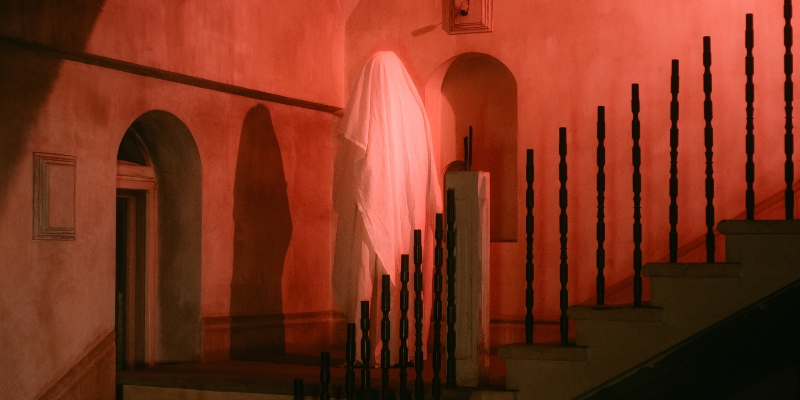Recently, upon mentioning to a friend that my upcoming novel had supernatural elements, he quipped: What is it with you and the paranormal? Good question! It’s true that I’m fascinated by the possibility of life beyond the veil, and by the limits of our current human knowledge. And I like to use these elements in my mystery novels to ratchet up the stakes, because of the element of not knowing.
We’ve all experienced it. I’m not talking the spectral visions from Disneyland’s Haunted House (though that ride was an early influence on me, not gonna lie). But rather the spooky feeling of shivers going up one’s back with no apparent cause. The uncanny sensation that the eyes of a painted image are following you around the room. The eerie feeling of waking in the middle of the night and wondering whether that unnerving thump was real, or part of a dream.
Merriam-Webster defines paranormal as something that stands outside the normal, or that which is not scientifically explainable. The not knowingness of the supernatural can enhance tension and put readers on edge, whether the novel is explicitly paranormal, or employs subtle inferences to something otherworldly, or simply hints at things that are beyond our ken.
The following are a few guidelines I use when incorporating the supernatural in my mystery novels, whether the story is cozy or gritty or noir:
Ya Gotta Have Rules
Keep your world-building internally consistent.
Rule number one for incorporating supernatural elements in a novel: The fictional world has to make sense.Rule number one for incorporating supernatural elements in a novel: The fictional world has to make sense. If there are spirits, are those ethereal beings able to show themselves at will? Are they always evil? Are the motivations the same on the other side of the veil?
If a character is psychic, can she see and feel all, at any time, or is she bound by the limits of her skills and energies, or by something else? If you’re introducing mythical creatures, how much agency do they have to interact with—to threaten or to help—the other characters in the novel?
No matter what, begin by grounding your world in the magical. The supernatural is not a coat of paint applied atop the secular and scientific human realm.
Rather, it should be integral to the novel’s framework: The main character(s) may or may not believe in the paranormal as the story begins, but the author must never lose sight of those supernatural laws and how they apply to the tale being told—and contribute to the mystery you are solving.
Don’t Show the Shark!
Steven Spielberg was considered a genius for not showing the dreaded shark in the movie Jaws, and instead allowing the audience’s imaginations to run amok with horrifying images. His decision was due more to technical difficulties than an artistic choice, but the point is that the human imagination—informed as it is by personal history and idiosyncratic quirks—tends to create much more vivid (and awful) images than what can be conjured on film.
Similarly, avoid the temptation to over-explain the supernatural elements. Keeping the reader in suspense, letting them wonder not only “what will happen” but “is it even real?” helps to build tension, support pacing, and enhance the mystery.
Recently I reread Stephen King’s classic ghost story, The Shining, and was surprised to realize that the actual ghosts appear rarely in the book. King instead creates a mounting sense of dread, based primarily on the horrifying setup of a mother and child snowbound and trapped with an unreliable and potentially violent man.
Just as with oversharing a character’s backstory early on, refrain from showing too much of the paranormal world on the page too soon. Instead, give your readers the opportunity to envision for themselves the worst. Manipulate emotions. Subvert expectations. Lean in to the not knowing.
Exploit the Horror of Real Life
It is a sad reality that much of human history, and everyday human behavior, is disturbing. Use that. Anchor your paranormal story in reality.
There is a reason people are so ready to believe that abandoned prisons, asylums for the mentally ill, poor farms, and orphanages might be haunted. How can so much suffering not have had an impact on the physical world such that the negative energy is absorbed by material objects and passed down through the ages? How might the residue of those fraught emotions and violent actions develop over the years—and how they might manifest in the present?
This is key to your storytelling.
The supernatural aspects of your story might also reflect troubling current events, the way Jordan Peele uses pervasive racism as a horror element in his film, Get Out. Or how Mary Shelley famously exploited suspicions about early science and technology in her archetypal account of Frankenstein’s terrifying monster.
Other real-world afflictions such as sleep paralysis, psychosis, memory loss, poisoning, and carbon monoxide overexposure can also lead to everyday people “experiencing” hauntings, vision, or demons. Such examples can be used to keep the reader wondering what is real and what is not.
And remember: Scary does not necessarily equal evil. Facing our fears may lead to healing and redemption. The reader is here for it; let your characters be, as well.
In Sum…
It is human nature to want to explore the fringes, to push the limits. As any caretaker of small children can attest, we humans are hard-wired to take risks. As we mature, quelled as we are by experience and the limits of the human body, most of us mellow.
But that does not mean we’re any less fascinated with pushing boundaries and exploring the unknowable, the unexplainable, and the unthinkable. We just explore it by different means.
It is a sad reality that much of human history, and everyday human behavior, is disturbing. Use that. Anchor your paranormal story in reality.In his seminal work, The Golden Bough, the anthropologist James George Frazer argued that all human belief systems are rooted in the attempt to interpret and to make sense of the world, not the least of which is “the fear of the human dead.” Not to mention the way those humans got dead.
One of the reasons we mystery writers are fascinated with murder is that it is the definitive crime, the ultimate disorder. A world grounded in an enhanced reality—a paranormal reality—permits the author to ratchet up the suspense around, and explore the implications of, a very human crime…and of the not knowing.
***


















